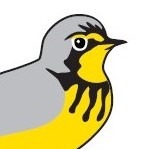The Common Loon is a welcome sight on Canada’s lakes each year, bringing joy to residents, cottagers, and boaters. For many, its ethereal call embodies the very spirit of Canadian summer.
Will you be spending at least one day a month in June, July, and August at a lake graced by loons? You can help these elegant birds by participating in Bird Studies Canada’s Canadian Lakes Loon Survey. Survey participants have been supporting loon and lake conservation for almost four decades by reporting on loon chick survival.
These efforts are important to the future of Canada’s loons. Common Loon populations are being negatively impacted by pollution, human disturbance, habitat loss, and other threats. Survey results indicate the average annual number of chicks produced per breeding pair has decreased over time across the country (see graph below).
Not only does the Survey make this important research possible, it also offers benefits to loon lovers. Survey participants enjoy many aspects of contributing, from having the opportunity to observe fascinating loon behaviours to knowing that they are helping to look after a lake that is special to them.
“It has been a privilege to be able to submit the data concerning the loons that visit the lake where we live,” says Lesley Barrenger, who has contributed to the Canadian Lakes Loon Survey in Québec since 1992. “We also try to act as stewards for the loons, and the lake, by discussing both with the other people living around the lake. As long as we are able, we will continue to survey this lake — it is part of life, and a way of life.”
Survey volunteers are needed for 2019. We encourage you to monitor loons at the lake of your choice – anywhere in Canada! To learn more or join now, please visit the Canadian Lakes Loon Survey webpage or contact the Canadian Lakes Loon Survey Coordinator Kathy Jones at volunteer@birdscanada.org.
In addition to monitoring, the Canadian Lakes Loon Survey supports volunteers in taking on stewardship roles at lakes. Visit the survey webpage for conservation tips and articles, nesting platform instructions, signs that can be posted near loon nest sites, and other resources. We also encourage you to download and share our educational poster showing the “Top Six Ways You Can Help Loons.”
Thank you to Survey participants Dieter and Marlies Schoenefeld for providing the video footage above and Darwin Park for providing the loon photo for the Featured News Stories menu.


